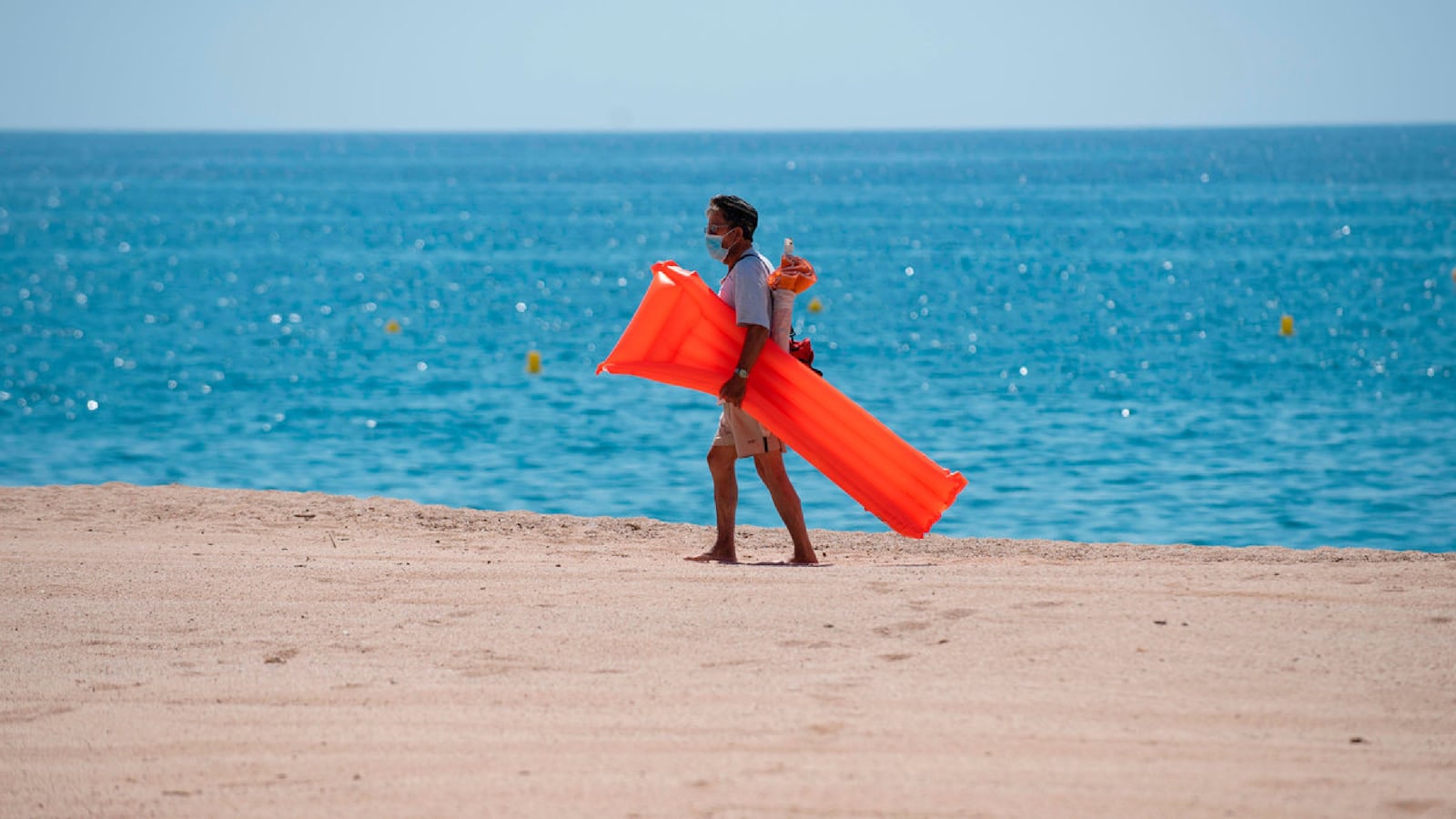For the past three months, many of us have surrendered to the passions of “hot vax summer.” The term refers to our collective release of pent-up demand bottled up by the pandemic for travel, fun, and living the good life. After all, at least for many, it was a long 15 months of hunkering and masking; since getting jabbed and unshackling our faces, the warm weather signaled that it was time to cut loose.
At least in theory. What hot vax summer actually turned into was disgruntled air passengers taking out their anger on flight attendants, the onset of the highly contagious Delta variant which led many destinations to reinstate mask mandates—a bit of a buzz-kill for the free-for-all hedonism and partying that was inherent to the idea of hot vax summer. Then all of the vague and ever-shifting European travel rules made many well-off Americans nervous to vacation on the continent. So, naturally, what happened was that domestic leisure travel skyrocketed. National parks were jam-packed, as were some of the toniest vacation towns in America. In places like Nantucket and Aspen a mixture of factors, including labor shortages, disgruntled customers, vertiginous prices, and White Lotus-esque entitlement, came together in ways that made hot vax summer more complicated than the care-free bacchanal many hoped it would be.
Our current season’s complex dynamics are in some ways distilled to their essence in the following incident on Nantucket this past month. A longtime renter who shelled out close to $50,000 on a three-week rental and asked not to be identified and for certain details to be changed in order to protect her privacy, was told by her real-estate agent to stop texting after she sent a series of messages flagging numerous maintenance issues with the pricey house she was renting with friends. The real-estate agent responded by saying the island was short-staffed and that it was a challenging summer in general, so she would basically need to suck it up.
To be clear, this is hardly the biggest tragedy of the summer (there are people trying to escape the Taliban in Afghanistan), but it does highlight some of the recurring tensions of hot vax summer. How should the upper end of the service economy respond amidst growing demand and less capacity? Do we all need to be just a little more patient and understand that the udon noodles aren’t on the menu because of supply chain issues? Is the takeaway from hot vax summer that real-estate agents will be willing to forfeit five figures of business because in towns like Nantucket, where fair- market rentals are more expensive than in 99 percent of housing markets, the $50,000 summer rental is basically peanuts? Or is it that the party will go on, no matter what? Even progressive mask enthusiasts like President Obama couldn’t resist the pull of hot vax summer. His 60th birthday party, which was reportedly supposed to be scaled back, ended up being a three-day rager on Martha’s Vineyard with a mere few hundred people. As The New York Post noted about the event: “hundreds of guests went unmasked, while their 200 servers were reportedly forced to mask up... and the tiny island’s residents endured a “s---t-show of traffic.”
On the neighboring island of Nantucket, the party is also still going strong.
While two of Nantucket’s most popular watering holes, Cisco Brewers and the Chicken Box, started requiring proof of vaccination or negative test results for entry, visitors aren’t letting that get in the way of a good time. (According to an Aug. 26 report, the town has reported 123 new COVID-19 cases over the last 12 days, a surge that is being attributed to the Delta variant.)
And even if employees are stretched and COVID cases are increasing, hot vax summer has been good for business. According to a number of Nantucket business owners and employees, restaurants and hotels were doing August numbers, usually the peak of the peak season, in June, when the ocean often isn’t even warm enough for out-of-towners to swim in.
There was hardly a rental car, hotel room, or restaurant reservation to be found for most of July. And it wasn’t uncommon for Ubers on the island to surge to $80 to go two miles—nosebleed pricing usually limited to the Hamptons on summer Saturday nights. One person told me that in July there were close to 70,000 people on Nantucket, compared to a typical summer peak of 55,000. The island was teeming, raising the question if there can be too much of a good thing.
“Some people believe the airport is responsible for bringing in too many people this year leading to chaos and congestion,” Assistant Airport Manager Noah Karberg said in July. In early August, the airport had to suspend Jet-A fuel sales; fuel usage, according to a local NPR report, is up 60 percent this year compared to 2019. The report noted that seasonal commercial flights have increased more than 30 percent on the island.
Over in Aspen, the town is heading off another theme of hot vax summer: mistreated restaurant workers. A local sandwich shop has a sign that says: “The whole world is short staffed. Please be kind.” Remember this was the summer that a farm-to-table establishment on Cape Cod shut down for a day of kindness after customers made the staff cry. This episode resonated across the country as restaurants dealt with similar challenges of operating in a not-yet-post-pandemic world.
Yet none of that is putting the brakes on the dining and nightlife scene in Aspen. Restaurants are busy and new ones are popping up at a fast clip to keep up with the demand. Indoor and outdoor seating is often full. This summer alone the ultra-chic Casa d’Angelo opened in the heart of downtown (where the price of some entrees approach three figures), along with Dante, a West Village import, in the St. Regis hotel. In the coming months, three more restaurants from marquee chefs and hospitality firms will plant roots in Aspen. Woody Creek Tavern, a popular brunch spot, often had two-and-a-half-hour waits in July and August. Sushi Nakazawa, whose New York City location once received four stars from The New York Times (it has since been demoted to three), has many takers for its $250 per person omakase tasting. It’s not hard for a couple to leave with an $800 check. Tourism measured by visitor count is up 10 percent, according to the Aspen Chamber of Commerce. “We are maxed-out busy. None of our businesses can hire enough,” according to one person familiar with Aspen’s economy.
Meanwhile, rents in Aspen have increased threefold since the start of the pandemic, according to someone with direct knowledge of the real-estate market. And many hotels are operating at full occupancy. The W Aspen, the first new hotel and condo to be built in 30 years, has been sold out practically the entire summer, according to a spokesperson. Their premiere fleet of rooms, the Sky Residences, are going for $2,350 a night after Labor Day.
“It’s supposed to be a La Niña winter, so I think we are heading into another busy season,” one Aspen insider told me, referring to a weather pattern that brings snow and cold to the western part of the United States. Local businesses, civic leaders, and health officials met last week to discuss how Aspen could be a model for “good [COVID] behavior” as ski season approaches.
Both Nantucket and Aspen, whose economies are almost solely reliant on tourism, face the same tightrope act of balancing hot vax summer and all that it entails—namely visitors coming to eat, drink, stay, and play—and the growing threat of the highly contagious Delta variant. Nantucket has a mask mandate for all indoor public spaces, but the health board, according to local news reports, has not enacted any capacity limits or social distancing requirements. Aspen hasn’t reinstituted a mask mandate, and visitors have taken a lax attitude.
As a hotel worker in Aspen said to me: “No one wants to wear a mask on vacation.”
As of the end of July, 86.3 percent of residents of Pitkin County, known for its progressive politics (Aspen was home to the first gay ski week) have received at least one dose of the COVID-19 vaccine, placing it third in Colorado. But as The Aspen Times reported in mid-August, Pitkin County’s high breakthrough infection rate has been linked to unvaccinated visitors. In whispered tones and hushed conversations, it’s visitors from Texas and Florida, which respectively have a 47.3 percent and 52.8 percent vaccination rate (which is inflated by snowbirds from Canada and those who flew in from Latin America), whom some locals, rightly or not, see as the culprits.
In poking at existing vulnerabilities in infrastructure and socioeconomic soft spots, hot vax summer has brought festering social issues related to tourism to the fore. Nantucket has been embroiled in a debate about limiting short-term rentals, for which a local measure was shot down in June. Aspen is continuing on its track to focus more on “destination management” that is aimed at “maintaining the short-term vitality and long-term sustainability of Aspen as both a tourist destination and place to live. This is not a ‘marketing campaign’ for more tourism,” according to the Aspen Chamber of Commerce.
Has hot vax summer gone off the rails? In some ways, but a few of the season’s most noteworthy, or shocking, happenings are unrelated to the pandemic, but rather to other societal and social ills. On Nantucket the beaches on the south shore had to close because of numerous shark sightings, something scientists say is linked to climate change.
In Pitkin County, where Aspen is located, park rangers and environmental organizations are vehemently warning visitors not to get too close if they see a moose. It has become such an issue that the bus driver on the way to Maroon Bells, a popular hiking destination, implored everyone: “Do not take a selfie with a bear or a moose. It will not end well.” Good advice for hot vax summer and beyond.

